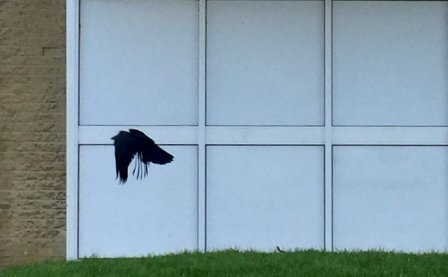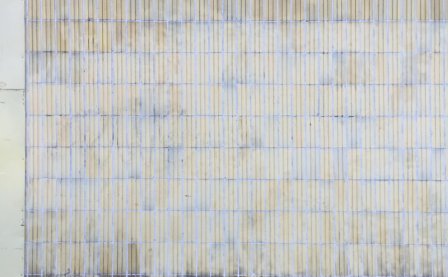We’re lazy, dependent, insecure bags of mush. We flock to music, to bands who sing about nothing that would stand up as a testable or coherent assertion, and we take whatever scraps we’re thrown as the precious reinforcement for the laughable concepts of who we respectively are. Our accounts of the world, of how it functions and how to navigate it, are so incredibly tenuous, so fragile, and so inconsistent with our lives as we experience them that the only dependable confirmation we can find is the empty breath and inane posturing of a distant rabble who are actually no better off than we are, who are just as clueless and who produce what are little more than desperate rationalizations of the knee-jerk crap that their circumstances, genes, and conditioning make unavoidable for them.
No doubt you’ve clicked onto this review expecting to learn that A SLAB ABOUT BEING HELD CAPTIVE is yet another album that will indulge the fantasies you’ve consecrated as reality and the pretensions you’ve nurtured as a self, and no doubt any attempt to persuade you otherwise will be futile. But regardless, the fourth album by Brighton’s WANDA GROUP is possibly the least epistemologically helpful and ego-friendly record in the NNA Tapes catalog, a vacuum of ambience, static, and found sound so anarchically diffuse that anyone wanting to construct a sense of place, time, and identity may end up walking away empty-handed.
The nearest and most recent touchstone for this kind of unbound sine wave of discontinuous noise is probably Graham Lambkin and Jason Lescalleet’s excellent Photographs, with both albums alluding to themes of dislocation, confusion, and depersonalization via fragments of rarefied interference and sampled mundanity. Yet with A SLAB ABOUT BEING HELD CAPTIVE, this detachment is rendered in a more violent and inhospitable language, its drawled flurries of electrical instability removing all likeness to the everyday where Photographs mercifully left a semblance of familiarity. Instead of the latter’s estranged peek into homely scenes and bucolic vignettes, Louis Johnstone’s latest release warps its already unsettling ephemera into a low-level nightmare, submerging and distorting its sampled environment to the point where the individual can no longer see a reflection of themselves or the world in them.
It also subverts a traditional function of music. That’s right, because music in its more conventional form, in its use of repeated patterns, cyclicality, and determinate structures, serves to generate an illusion of constancy, permanence, and the eternal. In “How to Learn How to Concentrate,” all of this endurance is dissolved, leaving us with a soundtrack to entropy and decay. This 20-minute piece features crests of radio disturbance and feedback that undulate through a series of non-sequiturs, discharging the residue of modern existence into the void as they shift from one crackling drift into another. Because the changes are unpredictable, because there is no meter or trackable rhythm, and because the intensity of the squalls fluctuate illogically, it never provides any reliable impression of space and location, any grounding in dependable coordinates to which the listener can relate themselves and exploit as a base for “navigation.” This lawlessness is so pronounced and obdurate that it completely disfigures the sounds of people fucking as they arrive at the 10:50 mark, squashing and splintering them to the point where they sound less erotic and more disturbing.
This unsettling defacement of quotidian geography and ontology continues into the second and final track, “No Mouth or Transparency and Variable Curvature,” in the end dissipating the individual’s self-conception as he fails to recognize the objects that, in reacting to and acting upon him, teach him what he can do and who he is. Here, snippets of the commonplace are torn from their roots and suspended in the volatility of thin air, alienated from the prosaic backgrounds that mapped their possibilities as exploitable objects. At the 3:11 juncture, what might be a heartbeat escapes from the hiss of industrial waste, palpitating weakly and indecipherably in the shocked midst of its limbo. Flots of telephonic effluvium and decomposition interchange abruptly all the way up to 15 minutes and 50 seconds, where either snowblind cars or a passing train mark some transition from nowhere to nowhere. Around two minutes later, we think the teetering fallout offers us the creaking of a gate and the rustling of grass, and for a second it seems as though a narrative is being scrawled in dissonant ink.
However, that dissonance is so blurred that it’s impossible to join the dots of its disconnected grain. Its predominance and mutability incites the suspicion of being lost in the penetrative hum of empty space, where there’s no longer any viable notion of direction, of up, down, left, right, forwards, or backwards. Even when A SLAB ABOUT BEING HELD CAPTIVE attains its occasional peaks of volume and anxiety, this absence of orientation and endpoint persists, and while it fuels the uneasiness and discomfort that’s perhaps the album’s greatest virtue, it also frustrates any conviction of movement, progression, or development, in turn suffocating close engagement. So, in the end it gives us no other rope than a nearly constant feeling of abandonment, stranding us in a remote, boundless din where the ability to perceive the usual symbols of our constructed worlds and selves have been lost, and all that remains is a frightened nervous system.
More about: WANDA GROUP




